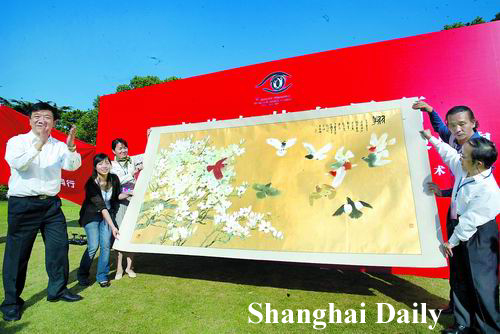
A large painting created by 10 disabled artists is
presented to the organizing committee of the Special Olympics 2007 at a ceremony
in the city yesterday. -Shanghai Daily
Shanghai Daily news
About 160 athletes competed in
track and field events as part of the 2006 Special Olympics Shanghai
Invitational Games yesterday.
Yesterday's preliminary events took place in a
lively and relaxed atmosphere, as the athletes enjoyed the feel of participation
more than struggling for gold medals.
Wang Zilong, an 18-year-old athlete
from Shanghai's Changning District, managed to fight into today's finals of all
the three items he took part in, including the high jump, men's 100-meter dash
and 4X100 meters relay race.
Wang said he participated in sports at school
many times, and the Invitational Games brought him the same joy.
"Everybody
feels happy here and we are not worried at the result of the competition," said
Wang. "We spend more time making friends than preparing for the
competition."
Mark Capano, head of the US delegation, said the Invitational
Games give intellectually disabled athletes special experiences.
"My athletes
enjoy and cherish the experience of making friends, of cheering each other up,"
said Capano.
About 1,000 spectators watched yesterday's track and field
preliminaries at stadiums around the city. Despite the amateur-level
competition, spectators gave athletes cheers and applause.
"Although the
competition was not as exciting as the professional ones, I was still
attracted," said a neighborhood committee employee surnamed Zhang. "Every
athlete was so hard-working and I can strongly feel their desire to show their
abilities."
Outside the stadiums, the games' logistic service provided the
athletes with a safe and comfortable life in the city.
The Shanghai Food and
Drug Administration has established a food security headquarters to ensure the
safety of all delegations attending the games.
More than 300 employees and
volunteers from the headquarters stayed in 11 stadiums, 30 hotels, 12
neighborhood communities and 11 other sites to monitor food and cooking around
the clock.
"We are monitoring the hotels' catering and accommodation, tea
breaks between matches, banquets for the delegations and dinners hosted by
neighborhood communities," said Xie Minqiang, vice director of the
administration.



